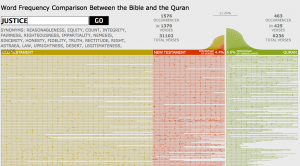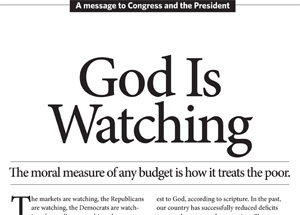challenges
This morning, as I caught up on what had been going on in the world over the weekend, I stumbled across a very interesting resource -- a website that compares the frequency with which words appear in the Bible and the Quran.
Although that in itself is an interesting tool, I was less interested in the comparison feature and more interested to see how often certain words appear in the Bible.
[Editors' note: This post is part of a series over the last few weeks on youth homelessness. In the September/October issue of Sojourners magazine, the Ali Forney Center and the Gay and Lesbian Alliance Against Defamation (GLAAD) ran an ad to raise awareness of the serious problem of LGBT youth homelessness.]
homelessness.]
Fact 1) About 40 percent of the homeless youth in the United States identify as lesbian, gay, bisexual, or transgender.
Fact 2) One in four teens rejected by their families becomes homeless.
Fact 3) Parents who identify as strongly religious are three times more likely to reject their children.
Yet for Carl Siciliano, founder and president of the Ali Forney Center, these aren't just facts -- they are his daily life.
Yesterday, the U.S. and Canada celebrated Labor Day, a day honoring workers. What does it mean to honor workers at a time of high unemployment, job insecurity, and the threat of lay-offs? In the U.S., the unemployment rate remains just over 9 percent, with no decrease of the rate in August and the recovery of jobs apparently stalled. As President Obama prepares to deliver his "jobs speech" this week, he faces immense challenges.
In the U.S., the first celebration of Labor Day was held in 1882 in New York City, organized by the Central Labor Union. In Canada, Labor Day can be traced back even further, to when Toronto Typographers went on strike for a 58-hour work week in 1872. Religious leaders, both nationally and internationally, recognizing the sanctity of labor, joined labor leaders in calling for justice for workers. Pope Leo XIII, for example, issued Rerum Novarum (On the Condition of Labor) in 1891, building a biblical foundation for the dignity of the worker.
So NPR just released the results of their survey for the "Top 100 Science-fiction and Fantasy Books." It's a great list with some of my all-time favorite books on it (although I disagree with their decision not to include young adult books on the list, but that's just me). Some 5,000 books were nominated for the list, but the ones that made the top 100 were mostly ones that were more than just entertaining stories; they are the stories that mean something. Stories that through their imaginings of alternative worlds tap into the power of the prophetic to deliver the message that our world too is not absolute, but imagined and therefore capable of change.
Now, while I have complained in the past about why imaginative challenges to oppressive orders in our world only seem to happen in speculative fictions, the genre still remains my favorite -- often for that very reason. As this recent comparison of women of sci-fi vs. women of prime time shows, there are just so many more substantial ways of being in the world than the status quo generally allows for. Speculative fictions not only present the possibility that the dreams we struggle for now could someday actually be realities, they are also the prophetic voice calling us into that world.
 The markets are watching, the Republicans are watching, the Democrats are watching, the media are watching, the pollsters and pundits are watching. The public is watching and is disgusted with Washington, D.C.
The markets are watching, the Republicans are watching, the Democrats are watching, the media are watching, the pollsters and pundits are watching. The public is watching and is disgusted with Washington, D.C.
When it comes to the bitter and ultra-partisan battles over the budget, the deficit, and the fast-approaching deadline for America defaulting on its financial commitments, the whole nation and even the world is watching.
But God is watching too.

"The mental space [books] occupied is being eroded by the thousand Weapons of Mass Distraction that surround us all," Hari told me last week. "It's hard to admit, but we all sense it: it is becoming almost physically harder to read books."
[Okay, I admit I didn't actually talk with Hari. The quote is from his newspaper column. But pop over to Twitter, and you can see how, in effect, he gave me permission to paraquote him at #interviewbyhari.]
Anyway, where was I? Oh, yeah, long-form reading. Hari quotes David Ulin, author of The Lost Art of Reading: Why Books Matter in a Distracted Time, who wrote that he "became aware, in an apartment full of books, that I could no longer find within myself the quiet necessary to read." Ulin wrote that he would sit down with a book, and find his mind wandering, enticing him to check his email, or Twitter, or Facebook. "What I'm struggling with," he writes, "is the encroachment of the buzz, the sense that there's something out there that merits my attention."
You don't need a ton of proof to know that more and more churches are struggling to survive. It seems churches that are in this predicament have one of two options: revive or die. There are a lot of books, seminars, and workshops given on how to go about reviving a church. However, there is not one cookie cutter, full-proof, and effective strategy in reviving a church. Having said that, it doesn't mean that it is impossible. There are many examples of struggling churches that have successfully revived the congregation, increased the health of the church, and expanded their ministry.
